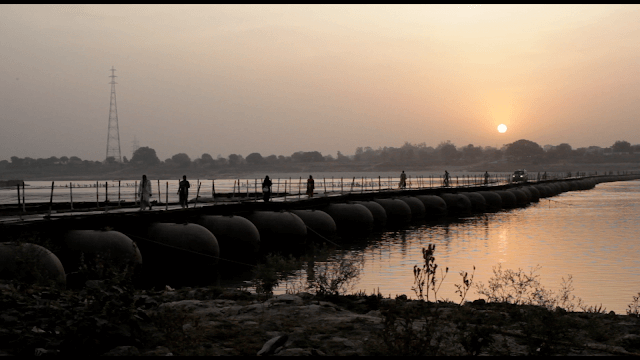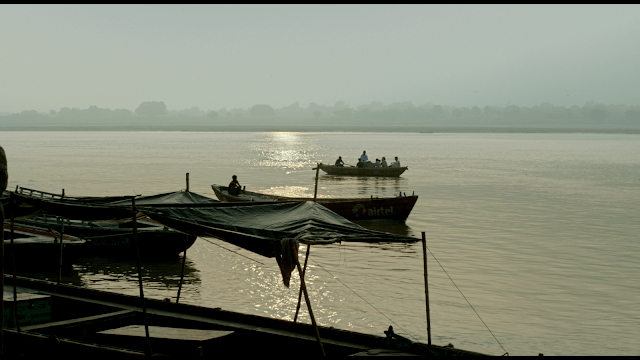There are few things more daunting than directing a debut feature film.
Yet, in shooting Feast of Varanasi, film-maker Rajan Kumar Patel managed to up the stress levels severely - alongside his role as director, Patel also wrote and produced the movie, invested his own money, shot on location in the holiest region of a foreign country, used expensive 35mm stock and had to battle the Gods too as heavy flooding destroyed his schedule.
How, I ask, did he find the experience of completing such a Herculean task?
Patel, for his part, encapsulates the trials and tribulations of his production with honest concision: "Knackering!"
Despite the hardships endured, the English-man has created something truly unique in Feast of Varanasi - an Indian-set twisted tragedy, a serial killer psychological thriller rooted deeply in Hinduism and, simultaneously, a meditation on how humans can commit the darkest of acts, often in the hope of spiritual fulfillment. Its a visually stunning, aurally sensational and wholly fascinating piece of cinema but one which may, had Patel's original plan come to fruition, have turned out rather differently.
"I'd never ever done a film before... I wasn't even thinking of directing" Patel clarifies, "I'm an urban town planner by trade." Indeed, having spent years writing and re-writing versions of the script - "we'd been through a hundred re-drafts" he remembers - Patel even had an agreement in place for a more experienced talent to shoot Feast of Varanasi.
"We met Raj Acharya who did Slumdog Millionaire with Danny Boyle, he was the first assistant director for the film. I offered the script to him and he said: 'yeah, I'll do it'."
Creative disagreement, however, led to the end of the working relationship and, serendipitously, led to Patel helming the feature too. "We spent one week in Varanasi," Patel recalls of his would-be collaboration with Acharya, "but we had very different ideas where the film would go. I was obviously from a Western perspective and he was looking at it from an Indian perspective." Before leaving the project, Acharya offered a piece of final advice: "He said 'maybe you should direct it'. [But] I'm already writing and producing it - I don't want to learn to direct at this stage!'"
Alas, to drive the project forward, the writer-producer added yet one more sting to his bow, directing a film for the first time and, as such, refers to himself as having been "the only trainee on the set." To say it was a baptism of fire may be an understatement as Patel explains: "Someone says to me: 'How did you learn to write? How did you learn about cameras?' It was on the job!"
"When you surround yourself with good people they become your lecturers," the debut director suggests to me. "I've been lucky to have half a dozen, at minimum, lecturers working with me on the film. You learn as you go along and as you spend a lot of one to one time with them you've got a lot more learning in some ways than a group of thirty students at a film school have when they're sharing the lecturer."
Having a clear vision of what he wanted to achieve, and what he wanted to avoid, Patel was able to sculpt a movie which shied away from the conventional and the obvious. In his tale of a serial killer on the lose in Varanasi, and the plights of those who become entangled in his tale, the camera lingers on the dualistic sights of India as it approaches Holi - the festival of colours. We see the bold and the bright, the raging of fires, the vivid colours of the grandiose ceremonies around us - equally, the earth, the sandstone and the mud, the shadows and the grey of ashes, of flames rescinded, are embedded throughout the movie. It is clear, in many ways, that the location, " a very layered, complex city", is as much a character in Feast of Varanasi as any of the people within its frames.
I put it to Patel that the manner he shot Varanasi was very different from the way, for example, Woody Allen captures London with a multitude of postcard-friendly visual cliches and the eye of a tourist. "I always say to people its not The Best Exotic Marigold Hotel!" Patel exclaims."I've gone the opposite way, I've gone quite organic and natural. I kept the rustic, how it is. It isn't a polished film, it's got to really look like the sandstone of the Varanasi."
Indeed, it is this enthusiasm to capture a reality to ground the story in, which caused the initial disagreements with Acharya about the direction of the film. The Indian film approach, he explains, may have led to a more overstated version of his script.
Referring to a central character, the mysterious and reclusive priest Nana (Ashwaith Batt), Patel states the differences between his approach and the direction the character may have gone if placed in the hands of others. "He isn't doing funny magic, he doesn't have a white beard like a wizard. I think the Indian way of doing things probably would have been wizard looking, [with a] white beard, shaking a drum kind of thing. That doesn't work for me. I had to go with the audience inside the head of Nana. I don't have to exaggerate what Nana's character is."
In making Feast of Varanasi the movie which it ultimately became, it was essential to capture Nana in the way Patel has - a peculiar mix of the fantastical and the wholly believable. It is his character which helps transform the feature from a conventional psychological thriller into something transcendent; a film about life as much as death, light as much as darkness and the twilight where these all exist. As Patel puts it: "The whole thread of the film is 'nothing is everything', 'the material is immaterial'." The concoction is a startlingly original blend of a Western genre movie and Indian mythology and features spiritual concepts of nirvana and moksha unlikely to be found in many features of a similar ilk.
In discussing the film, Patel names Apocalypse Now, Silence of the Lambs and Seven as three key texts which informed his thinking. It was, however, his attendance at a funeral which gave birth to the ideas which inspired both the movie and the book of the same name which he has also written. The image of a priest who wasn't who he said he was, who held deep secrets within his bones, formed in Patel's mind - perhaps he isn't as pure as we imagine. "I told my wife when i got home," Patel recalls, "and she said to me that [it was] disgusting. It was her face that made me think that there is a story in there somewhere..."
Thank you
A huge thank you for Rajan Kumar Patel for his time in discussing the production of Feast of Varanasi.The film receives its World Premiere at London Asian Film Festival on March 5th and receives a general release on March 11th.
You can keep up to date with the movie on its Facebook page and find more information about London Asian Film Festival here . A full review of the film will appear on this site on March 7th.






No comments
Post a Comment